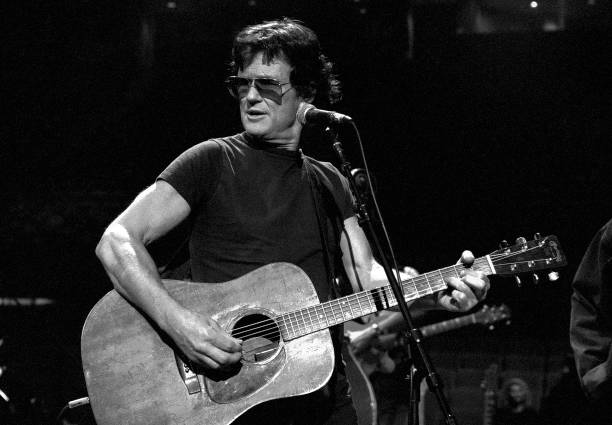 Introduction and Short Summary of the Song
Introduction and Short Summary of the Song
Released in 1970 on Kris Kristofferson’s debut album Kristofferson, “Best of All Possible Worlds” is one of his sharpest blends of humor, irony, and social critique. The song tells the story of a down-on-his-luck drifter who finds himself in trouble with the law, delivering his tale with a mix of cynicism and wit. Unlike Kristofferson’s tender ballads such as “Help Me Make It Through the Night,” this track leans into satire, poking fun at authority, hypocrisy, and the absurdities of modern life. It remains a fan favorite for its clever wordplay, rollicking rhythm, and biting honesty.
Origins of the Song
Kristofferson wrote “Best of All Possible Worlds” during the late 1960s, when he was struggling to make ends meet in Nashville while working odd jobs and writing songs. He was known for his sharp observational skills, often drawing from personal experiences with poverty, restlessness, and brushes with authority.
---> Scroll down for the VIDEO
The title echoes Voltaire’s satirical novel Candide, in which the philosopher Pangloss insists that humanity lives in “the best of all possible worlds” despite overwhelming evidence of suffering and injustice. Kristofferson’s appropriation of the phrase reflects a similar irony: his narrator insists that he lives in a great world, even as he recounts his misfortunes and failures.
When Kristofferson was released in 1970, the track stood out for its humor and lively delivery, offering contrast to the more somber and confessional songs on the album.
---> Scroll down for the VIDEO
Why “Best of All Possible Worlds” Was Released
As part of Kristofferson’s debut album, the song was included to showcase his range as a writer. The record contained deeply emotional works like “Me and Bobby McGee” and “For the Good Times,” but “Best of All Possible Worlds” highlighted his ability to use humor and satire to make a point.
The track also connected him to the outlaw country ethos, where artists rejected polished Nashville formulas in favor of gritty, honest, and sometimes irreverent songs. By releasing this piece, Kristofferson demonstrated that he wasn’t afraid to laugh at life’s hardships while also exposing its injustices.
The Message Conveyed in the Song
The song’s narrator is a drifter who ends up in jail, reflecting on his misadventures with dry humor. At its core, the message is about the absurdity of life, especially for those on society’s margins. The narrator’s troubles with the law highlight the double standards of justice, while his sardonic attitude points to resilience in the face of misfortune.
Lyrics like “I was runnin’ through the summer rain, tryin’ to catch that evenin’ train / And killin’ time with my old friend, playin’ high-low-jack and gin” show a character drifting aimlessly, yet still trying to find meaning in fleeting pleasures. The refrain—implying that even in misery, this is the “best of all possible worlds”—underscores the irony of the situation.
Kristofferson’s message is ultimately about perspective. By using satire, he exposes the absurdity of systems that punish the downtrodden while allowing greater injustices to flourish.
The Recording and Musical Characteristics
Musically, “Best of All Possible Worlds” has an upbeat, rollicking feel that contrasts with its ironic lyrics.
-
Vocals: Kristofferson delivers the lines with a conversational, almost deadpan tone, enhancing the humor and sarcasm.
-
Instrumentation: The arrangement features acoustic guitar, harmonica, bass, and light percussion, creating a folk-country sound with a touch of blues.
-
Mood: The playful rhythm and melody make the track feel more like a barroom tale than a heavy-handed critique, keeping it entertaining while still carrying a deeper message.
The recording’s simplicity mirrors the unvarnished style of Kristofferson’s early work, where raw honesty took precedence over polish.
Cultural and Commercial Impact
While “Best of All Possible Worlds” was not released as a single, it quickly became a favorite among fans of Kristofferson’s early work. Critics praised it for its wit and intelligence, noting how it demonstrated another dimension of his songwriting talent.
The song also resonated with the emerging outlaw country movement, which embraced songs that challenged authority, highlighted social hypocrisies, and favored authenticity over convention. Its ironic humor and unflinching honesty made it stand out in an era when many country songs were still bound by formulaic themes.
For Kristofferson’s career, the track reinforced his reputation as a literary songwriter who could mix philosophy, satire, and country storytelling. It showed that he was as comfortable making listeners laugh as he was making them cry.
Legacy of “Best of All Possible Worlds”
Today, “Best of All Possible Worlds” is remembered as one of Kris Kristofferson’s cleverest and most entertaining songs. While it may not have achieved the fame of “Sunday Mornin’ Comin’ Down” or “Why Me,” it has endured as a fan favorite and a staple of his live performances.
The song also remains relevant for its commentary on injustice and resilience. Its humor ensures that it never feels heavy-handed, and its satirical edge keeps it fresh even decades later. For many fans, it epitomizes Kristofferson’s unique blend of intelligence, irony, and humanity.
More broadly, the track highlights Kristofferson’s place within the tradition of singer-songwriters who use humor and storytelling as tools for social critique. Alongside his more serious works, it demonstrates his range and his refusal to be confined to one mode of expression.
More than fifty years after its release, “Best of All Possible Worlds” still resonates as a witty, ironic portrait of life’s absurdities. It may not carry the emotional weight of his most famous ballads, but it captures a side of Kris Kristofferson that is essential to understanding his artistry: sharp, playful, and unafraid to tell the truth with a smile.